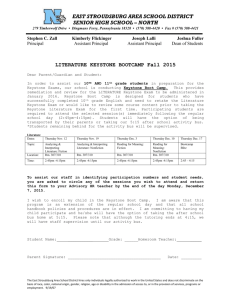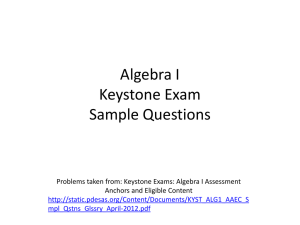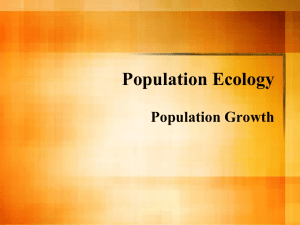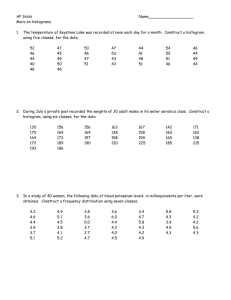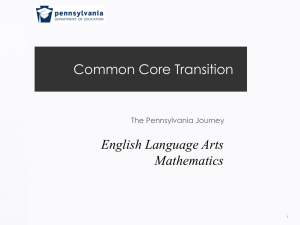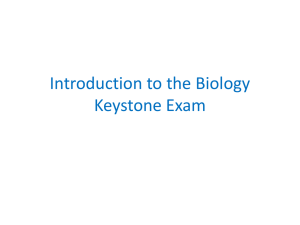Statewide Focus on Literacy - Keystone Area Education Agency
advertisement
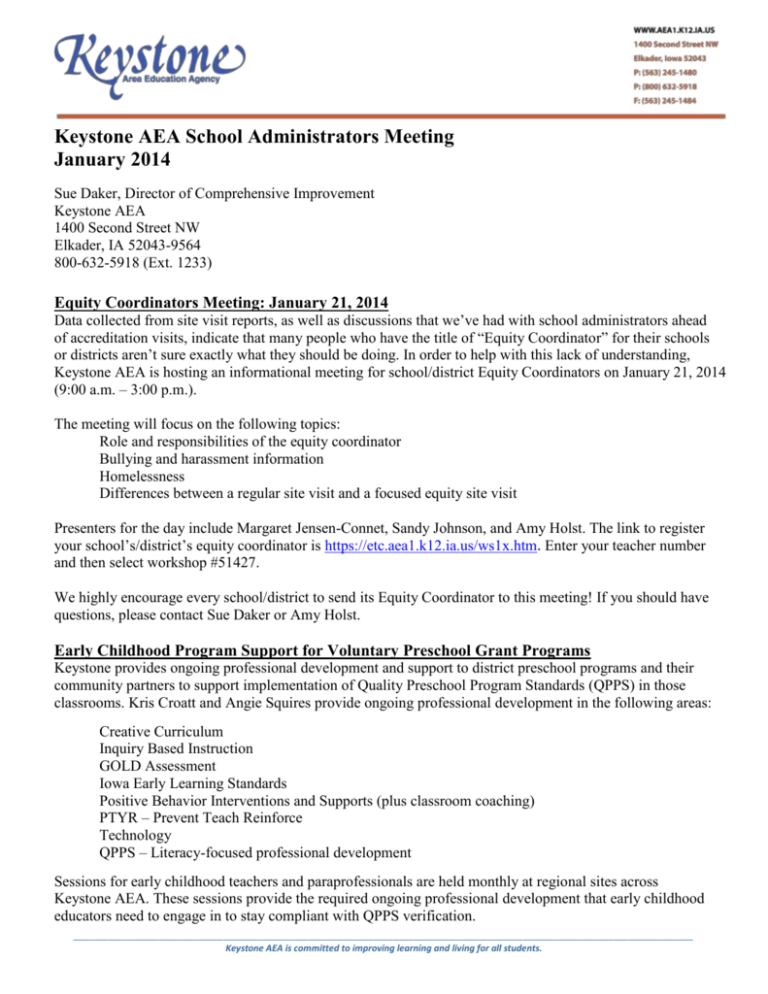
Keystone AEA School Administrators Meeting January 2014 Sue Daker, Director of Comprehensive Improvement Keystone AEA 1400 Second Street NW Elkader, IA 52043-9564 800-632-5918 (Ext. 1233) Equity Coordinators Meeting: January 21, 2014 Data collected from site visit reports, as well as discussions that we’ve had with school administrators ahead of accreditation visits, indicate that many people who have the title of “Equity Coordinator” for their schools or districts aren’t sure exactly what they should be doing. In order to help with this lack of understanding, Keystone AEA is hosting an informational meeting for school/district Equity Coordinators on January 21, 2014 (9:00 a.m. – 3:00 p.m.). The meeting will focus on the following topics: Role and responsibilities of the equity coordinator Bullying and harassment information Homelessness Differences between a regular site visit and a focused equity site visit Presenters for the day include Margaret Jensen-Connet, Sandy Johnson, and Amy Holst. The link to register your school’s/district’s equity coordinator is https://etc.aea1.k12.ia.us/ws1x.htm. Enter your teacher number and then select workshop #51427. We highly encourage every school/district to send its Equity Coordinator to this meeting! If you should have questions, please contact Sue Daker or Amy Holst. Early Childhood Program Support for Voluntary Preschool Grant Programs Keystone provides ongoing professional development and support to district preschool programs and their community partners to support implementation of Quality Preschool Program Standards (QPPS) in those classrooms. Kris Croatt and Angie Squires provide ongoing professional development in the following areas: Creative Curriculum Inquiry Based Instruction GOLD Assessment Iowa Early Learning Standards Positive Behavior Interventions and Supports (plus classroom coaching) PTYR – Prevent Teach Reinforce Technology QPPS – Literacy-focused professional development Sessions for early childhood teachers and paraprofessionals are held monthly at regional sites across Keystone AEA. These sessions provide the required ongoing professional development that early childhood educators need to engage in to stay compliant with QPPS verification. ____________________________________________________________________________________________________________________________ Keystone AEA is committed to improving learning and living for all students. There are currently over 120 early childhood teachers and over 180 paraprofessionals that participate in this ongoing professional development. Keystone provides this early childhood professional development annually due to the large turnover in early childhood staff. In addition to the monthly professional development in the areas listed above, those districts that are on-cycle for the required every-five-year verification process receive targeted assistance from Keystone staff in organizing for that desk audit for each of their early childhood classrooms. This assistance includes working with the principal, curriculum directors, teachers, paraprofessionals, school nurse, and other school and center personnel to get their paperwork in order for the district to be ready for the desk audit verification process. With the emphasis that Keystone has on PK-3 literacy, making sure that early childhood teachers have the professional development and support needed to do a top-notch job with our preschool students is critical. If you should have any questions, or need more information, please contact Kris Croatt, Angie Squires, or Sue Daker. Early Literacy Implementation Information What are the big ideas around the requirements that are to be in place for schools to implement the requirements of Iowa Code Section 279.68 and 281—Iowa Administrative Code 62 that was passed during the last legislative session? Provision of universal screening in reading for students in kindergarten through third grade All K-3 students, 3 times/year Use Department-approved tool Valid, reliable, technically adequate for universal screening Use vendor benchmarks Provide alternate assessment for students with disabilities whose IEP indicates it is required Progress monitoring for students who exhibit a substantial deficiency in reading Monitor weekly Use Department-approved tool Valid, reliable, technically adequate for progress monitoring Use vendor benchmarks A student with a substantial deficiency in reading is a student whose reading performance is below a standard set on an approved assessment AND whose progress on an approved assessment is minimal (this definition will be operationalized by the Department) Provision of intensive instruction – including 90 minutes daily of scientific, research-based reading instruction – for students who exhibit a substantial deficiency in reading 90 minutes a day of scientific, research-based reading instruction, which may include: Small group instruction Reduced teacher-student ratios More frequent progress monitoring Tutoring or mentoring Extended school day, week, or year services Summer reading programs A reading curriculum that does all of the following: Assists in developing skills to read at grade-level Provides skill development in phonemic awareness, phonics, fluency, vocabulary, and comprehension Is implemented by certified staff with appropriate training and professional development Is implemented during regular school hours Provides curriculum in core academic subjects The intensive instruction is provided until the reading deficiency is remediated 2 Notice to parents that a student exhibits a substantial deficiency in reading, including strategies that parents can use at home to help the child succeed Notice to parents that their student has been identified as having a substantial deficiency (annually) Information on services currently provided to the student (annually) Notice of proposed supplemental services the district will provide (annually) Information on strategies the parents/guardians can use to help the child succeed (annually) Information on their student’s academic progress and any other useful information (quarterly) A plan for remediating the reading deficiency in a parent contract (one time) Notice that they may enroll their student in an intensive summer reading program if not proficient at the end of 3rd grade (one time) Notice to parents of such a student’s subsequent progress Provision of an evidence-based summer reading program for students who exhibit a substantial deficiency in reading (effective May 1, 2017) Beginning May 1, 2017, each district must provide an intensive summer reading program for any student who exhibits a substantial deficiency in reading A one-time waiver from this provision will be available The standards for an intensive summer reading program are being developed and reviewed by the Iowa Reading Research Center (IRRC) Retention of any student who is not proficient in reading by the end of the third grade, did not attend the summer reading program, and does not qualify for a good cause exemption from the retention requirement (effective May 1, 2017) Beginning May 1, 2017, a student must be retained in grade 3 who: Is not proficient by the end of 3rd grade, AND Does not enroll in and complete the intensive summer reading program, AND Does not qualify for a good cause exemption The Iowa Department of Education will be holding a series of webinars for school district personnel to attend for further clarification regarding implementation of the Early Literacy Initiative as described above. We will continue to keep educators apprised of additional information about the implementation requirements as they become available. Literacy Focus for Keystone AEA Keystone AEA’s internal Literacy Initiative Team (LIT) continues to move forward with plans to support universal, targeted, and intensive instruction in reading through delivery of professional development and coaching support beginning summer 2014. Our current elevator speech continues to be: With future professional development as our goal, Keystone AEA’s LIT is working to compile research behind how kids learn to read, how to teach reading, and how to assess reading progress and difficulties. The focus of the work will continue to be around the 5 pillars of literacy as they relate to a multi-tiered system of support in grades PK to 3. We continue to look forward to partnering with our schools to improve reading instruction and student achievement. Building principals should have received an email from Sandy Caya just before the holidays with a link to a survey that we’d like all elementary principals to complete. Your responses to the survey will help inform Keystone’s Literacy Initiative Team of locations and the group of educators that will be initially offered the opportunity for literacy professional development and ongoing coaching during implementation of that learning. We would like 100% of our principals to respond to the survey, so we can gauge interest and other related details to help our planning. If you should have any questions, contact Sue Daker, Pam Fields, or Sue Schulz. 3
